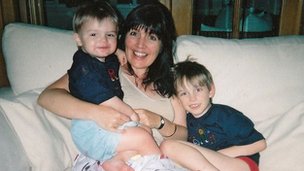SilverbladeTE
Senior Member
- Messages
- 3,043
- Location
- Somewhere near Glasgow, Scotland
http://www.bbc.co.uk/news/health-21786689
is
Holiday cruise left woman feeling permanently seasick
By Philippa Roxby Health reporter, BBC News

While Michele-Marie Roberts was enjoying a two-week dream cruise to Hawaii with her husband and two sons, she had no idea that her world would be turned upside down when she stepped on to dry land.
Continue reading the main story
“Start Quote
I love Zumba, but when I stop it looks like I've consumed all the sherry in the trifle”End Quote Michele-Marie Roberts
"I walked down the gangplank and collapsed - completely blacked out. I got the flight back home and I was staggering all over the shop.
"I was slurring my speech - on one occasion I blacked out while chopping vegetables," she recalls.
The holiday ended in January 2008 but Michele-Marie still feels as if she is on that cruise ship. She's been seasick for five years.
"It's like the disorientating feeling you get after coming off a waltzer at the fair - all the time. It's horrendous."
When it is at its worst, even lying down doesn't help, she says.
Mal de Débarquement Syndrome (MdDS), as the condition is known, is extremely rare and very little is understood about why it occurs and what can cure it. Few doctors have even heard of it.
Continue reading the main story
Facts on MdDS
- Little research has been carried out on Mal de Débarquement Syndrome, which means the "sickness of disembarkment".
- Only around 100 cases have been studied by scientists.
- As a result, its underlying causes are unknown and there is no cure.
- It tends to occur after travel on boats and ships but can be triggered by air travel.
- It is characterised by constant feelings of rocking, bobbing, swaying and nausea.
- Other symptoms can include extreme tiredness, cognitive slowing or "brain fog" and mood changes.
- It has been around for a long time. In 1881 an article in The Lancet alluded to the problem when describing the experience of sailors when they tried to walk on the ground after being at sea.
Michele-Marie, from Berkshire, was sent for an MRI scan and tested for multiple sclerosis and a range of other disorders before she was finally diagnosed six months after her cruise, thanks to doctors at the Royal Berkshire Hospital who recognised her symptoms.
But not all sufferers are quite as lucky - many can spend years looking for a diagnosis.
'Draining'
Unsurprisingly, feeling sick and in motion every minute of her waking life has taken its toll. She says it ruined her marriage because she could no longer look after or home-school her two sons, who are autistic, leaving her husband to take on the role of full-time carer.
After the divorce, at the age of 49, she had to look for a job for the first time in years, despite feeling physically and mentally drained by the persistent seasickness.
She was employed for a while but the experience was too draining so she decided to set up her own business - a dating agency called Wavelength for single parents of special needs children.
Michele-Marie Roberts with her sons Calum and Corey before the onset of MdDS
"I have days when I feel sorry for myself and there are days when I wake up and I wonder if it's gone away. But then it says, 'da-da - here I am'."
There are times when the syndrome can feel particularly debilitating, such as when she feels stressed, when shopping in supermarkets and using a computer.
Strip lighting can also aggravate the feelings of rocking and swaying.
Thankfully there are activities that alleviate the symptoms too, she says, including vigorous exercise, swimming and driving. She does at least two hours of exercise every day to help her cope.
Continue reading the main story
Jane's story
Jane Houghton's feeling of being in constant motion, even on dry land, started in July 2001 following a short holiday on a small boat off the coast of Spain.
Her symptoms have never eased since.
Jane, 48, from Cheshire, feels normal only when she is moving again - in a car, train or even a boat or a rollercoaster.
Trying to get a diagnosis took her more than a year. Her GP treated her for motion sickness, then sent her for a brain scan then to an ear, nose and throat specialist - but the tests all came back normal.
Jane began to think it was all in her head and was treated for depression - but she did not give up looking for a diagnosis.
Eventually she contacted the Vestibular Disorders Association in the United States and they pointed her to Mal de Débarquement Syndrome.
Jane Houghton is founder of the UK support group for Mal de Débarquement Syndrome
"The more motion I am in the better," she explains.
"So I love Zumba, but when I stop it looks like I've consumed all the sherry in the trifle."
But she will never go back on a boat, despite loving the sea, because of the risk that her condition could get even worse.
'Going bonkers'
Michele-Marie believes that she was susceptible to Mal de Débarquement syndrome because she was a women in her 40s who suffered from migraines - something suggested by a research paper from 2009, although the link is not straightforward.
She wants other women to be aware of her story so they can decide if they could be at risk too.
The same study found that MdDS was a disorder of brain plasticity, which means that the neural pathways in the brain are unable to change in response to changes in behaviour or environment.
In particularly rough seas during the cruise, Michele-Marie says that everyone was falling over and suffering from seasickness apart from her. Yet on dry land, she is the one slurring her words and being mistaken for being drunk.
"You think you're going bonkers when you have MdDs. You feel so isolated. The doctors did tests on me and there's very little they can do," she explains.
"I feel I was predisposed to it - and other women should know about it."
is
